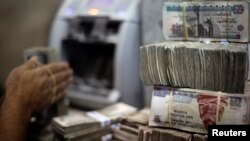The pain of Egypt's currency devaluation may be felt well before the benefits, creating a period of at least several months in which there is little positive news to offset rising inflation and falling living standards, businessmen and economists say.
By bringing the Egyptian pound down to levels which the markets consider fair value, the devaluation promises to attract fresh capital into the country and end a hard currency shortage that has plagued the economy for years.
Corporate executives say they will finally be able to make investment decisions based on a transparent, predictable currency market run by banks, rather than an opaque black market in dollars that swung wildly amid profiteering and speculation.
"Before, I used to say we were moving in the dark. We couldn't see because the situation was so blurred. Now at least we have the lights turned on," Hani Berzi, chairman of Edita Food Industries, told Reuters.
Despite Egypt's history of street protests since 2011, there is no indication so far that the devaluation will cause significant unrest, and many ordinary Egyptians say they understand the move was inevitable.
But Egypt's other economic problems mean the hoped-for inflows of hard currency may be slow to arrive, at least in the huge volumes required to eliminate the dollar shortage and convince investors that the pound has stabilized.
Red tape, a sluggish bureaucracy and primitive regulation continue to deter foreign investment. The cabinet is expected this month to consider a draft investment law tackling these obstacles, but it could take months to start having an impact.
The government aims to obtain the first $2.5 billion disbursement of a planned $12 billion International Monetary Fund loan as soon as this month. That would be dwarfed by the country's hunger for hard currency, however.
Official data is not available but bankers say privately they believe Egyptian banks need several billion dollars to fill their existing commitments. In addition, unmet commercial demand for dollars is estimated at around $8 billion to $10 billion.
"Filling this demand and ending the dollar shortage will not be the work of days. It will take weeks or months," said one Egyptian banker familiar with the currency market.
Regional investment bank Arqaam Capital said the devaluation could bring $12 billion of foreign money into Egypt's bond market and $4.5 billion into equities - but it estimated this might take a year.
A local investment banker said Egypt would avoid one problem often faced by countries after devaluations: an inflated debt burden for companies borrowing abroad. This is because the central bank has prevented local banks from lending in foreign currency unless the borrower earns foreign exchange, he said.
On the other hand, Egypt probably cannot hope for the surge in export receipts that other economies would enjoy after a devaluation, because it is heavily dependent on imports of food as well as components and materials for its industry.
Inflation
Since the pound's peg of 8.8 to the dollar was abandoned on Thursday, the currency has tumbled to near 17 - by far its largest drop in a series of depreciations over the last 15 years.
The resulting rise in inflation probably won't be as big as the currency's fall, partly because about 90 percent of imported consumer goods were already being paid for at black market currency rates in the months before the devaluation.
Reham El Desoki, senior economist at regional investment bank Arqaam Capital, estimated the devaluation and fuel price hikes introduced last Friday would raise annual inflation to 18-20 percent around the end of this year and a peak of about 22-24 percent next year, from 14.1 percent in September.
The economy has coped with inflation at close to those levels in the past 15 years, Desoki noted. "It is going to be a shock, but I think it is the kind of shock that can be absorbed."
Nevertheless, the devaluation will eat into the incomes of ordinary Egyptians. Among the middle classes, travel abroad has become harder, students saving to study overseas have seen their plans shattered, and luxury goods have moved out of reach.
For people below the poverty line - more than a quarter of the population of about 91 million, according to the state statistics agency - higher inflation may be much more painful.
There is considerable public anger and dismay at the devaluation but no sign that it will create a serious threat to the government, which has used police to disperse political protests and can count on support from loyal state media.
However, authorities are under pressure to do more to protect people from the economic reforms. On the day after the currency peg was scrapped, officials said they would boost spending on a consumer subsidy scheme and keep the price of bread flat, even though the devaluation makes it more expensive to import wheat.
That will slow Egypt's drive to cut a huge state budget deficit that totaled 12.2 percent of gross domestic product in the fiscal year through last June.
Partly because of the devaluation, the government could overshoot its 9.8 percent deficit target for the current year by several percentage points, Desoki said.
That may disappoint Egypt's international donors, but they are likely to accept the target being missed as they understand the economy is in a "critical transition phase", she said.





